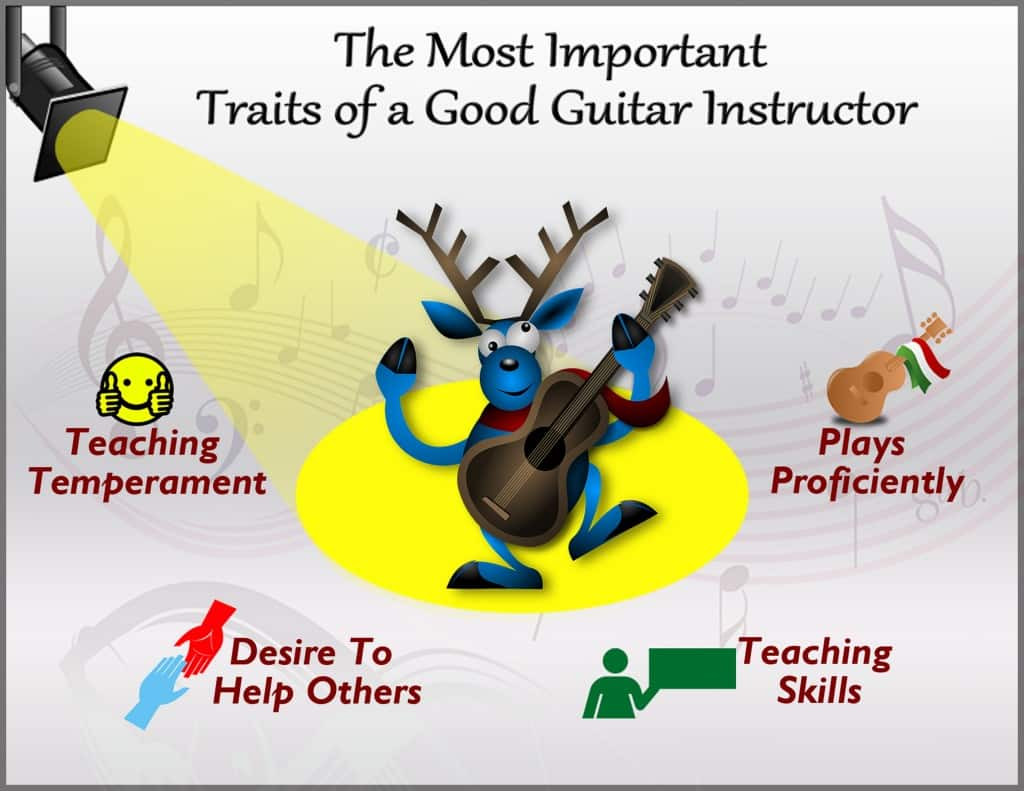Learning to play the guitar is an incredibly fulfilling journey. To ensure you start on the right foot, securing the guidance of a qualified Guitar Instructor is paramount. The right teacher will not only provide the necessary skills but also keep you motivated and aligned with your musical aspirations.
However, with a plethora of guitar teachers available, distinguishing truly exceptional ones can be challenging. Choosing the wrong guitar instructor can be disheartening, often leading beginners to mistakenly blame themselves for a lack of progress.
Drawing upon 40 years of experience hiring instructors at Starland School Of Music, I’ve compiled key insights to help you discern the best guitar instructors from the rest:
1. Teaching Methodology: Look for a Structured Approach
The hallmark of excellent guitar instructors is their structured teaching methodology. They begin by evaluating your current skill level and musical objectives, then develop a systematic plan to bridge that gap. These instructors utilize exercises to build a foundation for more complex techniques and are transparent about their teaching process. In contrast, some less effective teachers adopt a haphazard, “winging it” approach.

“Winging it” instructors might teach unrelated topics week after week, perhaps a random lick one lesson and a disconnected song the next, lacking a cohesive curriculum. This unstructured method can leave students feeling lost and unsure of their progress, and unclear about what to practice effectively.
Important Consideration: While some guitar instructors may aim to please students, resist the urge to constantly demand learning the latest trendy lick or song, especially if it derails a well-structured teaching plan. If your guitar instructor has a plan, meet them halfway and trust the process.
2. Lesson Accessibility: Consider Travel Distance
Consistency is vital for effective learning. Opting for a guitar instructor located within a reasonable travel distance increases the likelihood of consistent attendance and minimizes missed lessons. Individual tolerance for travel varies, so be honest with yourself about what’s manageable. A general guideline of a 30-minute maximum commute is often practical.
3. Playing Proficiency: Competence Over Virtuosity
While being a world-class performer isn’t essential for a guitar instructor, competence on the instrument is crucial. Just as a successful football coach doesn’t need to be a better player than their team, a great guitar instructor needs to possess strong guitar skills.
In the initial stages of learning, prioritize guitar instructors who excel at teaching fundamental techniques.
As you advance, you might seek out a guitar instructor specializing in your preferred genre. A proficient player serves as both an inspiration and a guide who has navigated the learning path and can effectively show you the way. However, remember that exceptional playing ability doesn’t automatically translate into exceptional teaching skills.
4. Instructor Experience: Gauging Depth and Breadth
Student Volume as an Indicator: Inquire about the number of students your prospective guitar instructor currently teaches and has taught in the past. While there’s no magic number, a higher student count generally suggests greater experience. It also often indicates student satisfaction and retention.
 Alt text: Experienced guitar instructor guiding a student, highlighting the value of experience in effective guitar teaching.
Alt text: Experienced guitar instructor guiding a student, highlighting the value of experience in effective guitar teaching.
However, be mindful of extremes. If a guitar instructor has too many students, they might lack the time to dedicate sufficient attention to your individual progress. An organized guitar instructor can manage a larger student load more effectively than a disorganized one.
Personal Anecdote: During a period in my career, I taught 60 half-hour private lessons per week. Despite the demanding schedule, I maintained detailed tracking of each student’s progress and provided focused attention during every lesson. Effective organization makes a significant difference.
Student Proficiency Levels (Past and Present): If you’re a beginner, seek a guitar instructor with a proven track record of successfully teaching beginners. Teaching beginners differs substantially from instructing intermediate or advanced students in specialized techniques or stylistic nuances.
Age Range of Students: Students can broadly be categorized into children, teenagers, and adults, each with distinct learning needs and interests. The ideal guitar instructor should have experience teaching students within your age group.
5. Formal Training: The Impact of Pedagogy
An instructor’s training background can significantly influence their teaching effectiveness. There are two primary types of training relevant to guitar instructors: training in guitar performance and training in teaching methodologies.
Learning from skilled private guitar instructors can be invaluable, not only for developing guitar proficiency but also for implicitly learning effective teaching practices.
Instructors often unconsciously model their own past teachers. They may adopt methods and materials that were beneficial to their own learning and avoid approaches that were less effective.
Formal music education is another avenue of training. While university programs often emphasize classical guitar, many guitar instructors have graduated from institutions specializing in contemporary music. Notable schools include Musician’s Institute in Los Angeles, Grove School Without Walls, and Berklee College of Music in Boston, MA.
Specific training in guitar pedagogy, or “How to Teach Guitar,” is less common. To my knowledge, dedicated programs are rare, with the exception of instructor training at Starland School Of Music, where we teach our proprietary system and fundamental teaching principles.
Resources like “How To Teach Guitar” by Joe Livoti are valuable, and practical experience with method books and student feedback also contribute greatly to a guitar instructor’s pedagogical skills.
6. References: Gathering Student Feedback
Most guitar instructors will provide references from current or former students. While they are likely to offer contacts of their most satisfied students, these references can still offer valuable insights for your decision-making process. When contacting references, consider asking these questions:
- How long have you been taking lessons?
- What skill level would you consider yourself? (Is their level comparable to yours?)
- On a scale of 1 to 10, how satisfied are you with your (or your child’s) lessons, with 10 being completely satisfied?
- If they rate it below 10, ask what would make it a 10. This question often elicits more candid feedback about areas for improvement.
- Is the guitar instructor punctual?
- If they are no longer taking lessons, why did they stop?
- Is there any other information that would be helpful in making my decision?
7. Motivation: Passion for Teaching
Inquiring about a guitar instructor’s motivation for teaching can reveal their underlying approach. While many guitarists understandably teach to earn income while pursuing their musical careers, the most dedicated instructors often express genuine joy in sharing their passion and helping others experience the rewards of learning guitar. These are often the instructors who bring the most enthusiasm and dedication to their teaching.
8. Teaching Resources: Method Books and Materials
Always ask prospective guitar instructors about the method books they utilize and their familiarity with other instructional materials. The resources they employ can indicate their teaching philosophy and level of organization.
Crucially, inquire if they use instruction books at all. Unless a guitar instructor has developed a comprehensive and well-structured system of their own, the absence of established materials may suggest a less systematic approach.
Furthermore, spending lesson time writing out exercises or materials is inefficient. It’s a less effective use of your paid lesson time compared to using pre-prepared books or worksheets. Numerous excellent and affordable method books cover every aspect of guitar playing, offering a wealth of learning material.
 Alt text: Infographic summarizing key traits of an ideal guitar instructor, emphasizing reliability, flexibility, structured teaching, and strong communication skills.
Alt text: Infographic summarizing key traits of an ideal guitar instructor, emphasizing reliability, flexibility, structured teaching, and strong communication skills.
9. Reliability and Flexibility: Balancing Consistency and Understanding
Dependable guitar instructors are punctual and consistent in their lesson schedule. While occasional reschedules due to gigs or vacations are understandable (and often a positive sign that they are active musicians), consistent reliability is essential for student progress. They should be considerate of your time, provide adequate notice for rescheduling, and offer reasonable alternative times.
Similarly, you might occasionally need to reschedule. Most guitar instructors are accommodating with reasonable notice. However, be aware that last-minute cancellations may result in the loss of lesson fees, as the instructor loses income for that time slot unless they are compensated or given sufficient notice to fill the slot.
10. The Learning Environment: Optimizing the Space
Consider the environment where lessons will take place. Is it conducive to music learning? A music school often provides an ideal setting, specifically designed for musical instruction.
The atmosphere of a music school, with others learning and creating music, can be inspiring.
A dedicated teaching space in an instructor’s home is a good second option. It should be equipped for teaching, reasonably isolated from distractions, and ideally climate-controlled for comfort. Inspiring décor and posters can enhance the learning environment.
Having the guitar instructor come to your home is generally the least desirable option.
Pros:
- Reduced travel for the student.
- Convenience.
Cons:
- Increased potential for distractions at home.
- Lack of exposure to other musicians and a musical learning environment.
- Difficulty attracting top-tier guitar instructors, as home visits are less time-efficient and often not conducive to optimal teaching conditions.
- Potentially harder to mentally transition into “lesson mode” at home.
Free Checklist: “Top Tips For Choosing A Guitar Instructor”
11. Personality and Communication: The Human Element
A good teaching personality encompasses several facets. While individual personalities vary, certain traits are consistently found in effective guitar instructors. Obvious qualities include strong communication skills, a pleasant demeanor, genuine interest in students, and patience.
A less immediately apparent but crucial trait is the ability to simplify complex concepts into digestible parts and then guide students in reassembling those parts into a comprehensive understanding.
Some individuals possess a natural aptitude for this, making teaching more intuitive and enjoyable for them. Interestingly, highly gifted musicians sometimes struggle to teach because they didn’t personally experience the step-by-step learning process that many students require. They might assume concepts are self-evident and not break them down effectively. Guitar instructors who have worked diligently for their own skills can often draw on their learning journey to better assist their students.
Final Thoughts: Making an Informed Decision
Before committing to a lesson program, it’s wise to interview several prospective guitar instructors, ideally those recommended through referrals. I often interview 8 to 12 candidates before hiring a single instructor at my school.
Seek referrals from friends who are satisfied with their guitar lessons. Local music stores or guitar shops are also excellent resources, as they often have connections with guitar instructors. Music schools themselves can also provide referrals.
Online directories like Craigslist or local newspapers can also be starting points for finding advertised guitar lessons. Ultimately, taking some action is better than inaction.
If you find that your initial guitar instructor isn’t the right fit, don’t hesitate to try another.
Above all, consistent practice is the cornerstone of guitar learning success.
